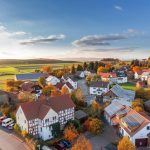Manchester’s high-rise apartments offer stunning views and urban living, but energy efficiency can be a challenge. High energy bills and environmental concerns need innovative solutions. This comprehensive guide unlocks strategies specifically tailored for Manchester’s unique architecture and climate. From smart technology to effective insulation, explore practical steps that not only reduce energy consumption but also enhance comfort. Discover how making informed choices can transform your living space into a sustainable sanctuary while saving you money.
Understanding Energy Efficiency in High-Rise Apartments
Energy efficiency in high-rise apartments refers to the practice of reducing energy consumption while maintaining or improving living standards. In the context of Manchester, where high-rise living is common, understanding energy consumption patterns is crucial. These buildings often have higher energy needs due to shared amenities and the sheer number of residents.
Dans le meme genre : Vallourec stock: unpacking shareholder insights and dynamics
In Manchester, the energy consumption patterns in high-rise apartments show significant usage in heating, cooling, and lighting. This is attributed to the city's climate and the architectural design of these buildings. Improving energy efficiency in these apartments can lead to substantial benefits for both residents and landlords.
For residents, enhanced energy efficiency means lower utility bills, contributing to significant savings over time. It also results in a more comfortable living environment, with better temperature regulation and improved air quality. For landlords, energy-efficient buildings are more attractive to potential tenants and can command higher rental values. Additionally, they contribute to environmental sustainability, aligning with Manchester's goals for reducing carbon emissions.
A découvrir également : Top Strategies for Optimizing Renewable Energy Solutions in UK Residences
By focusing on energy efficiency, high-rise apartments in Manchester can become more sustainable, cost-effective, and appealing places to live, benefitting all stakeholders involved.
Energy-Saving Technologies for High-Rise Apartments
Implementing energy-saving technologies in high-rise apartments is crucial for reducing energy consumption and enhancing living standards. These technologies not only improve efficiency but also offer substantial savings and environmental benefits.
Smart Thermostats and Energy Management Systems
Smart home solutions like smart thermostats play a pivotal role in energy management. They allow residents to control heating and cooling systems remotely, adjusting temperatures based on occupancy and personal preferences. This leads to more efficient energy use and reduces wastage. Energy management systems can further optimise energy consumption by analysing usage patterns and suggesting improvements.
High-Efficiency HVAC Solutions
Upgrading to high-efficiency HVAC systems can significantly reduce energy usage in high-rise buildings. These systems are designed to provide optimal heating, ventilation, and air conditioning while consuming less energy. They often include features like variable speed motors and advanced filtration, which enhance performance and improve indoor air quality.
Energy-Efficient Lighting and Appliances
Switching to energy-efficient lighting, such as LED bulbs, and appliances can drastically cut down electricity consumption. These technologies use less power and have longer lifespans, offering cost savings over time. The integration of smart technologies with these appliances allows for better energy management, further reducing overall consumption.
Sustainable Practices for Residents and Property Managers
Incorporating sustainable practices in high-rise apartments can significantly enhance energy efficiency while promoting a healthier living environment. Both residents and property managers play a crucial role in implementing these green initiatives.
Recycling and Composting Programs
One effective strategy is to establish recycling and composting programs within the building. By providing designated areas for sorting waste, residents can easily participate in reducing landfill contributions. Composting organic waste not only minimizes waste but also creates nutrient-rich soil that could be used in community gardens.
Encouraging Sustainable Commuting
Promoting sustainable commuting options such as cycling, walking, or using public transportation can further decrease the building's carbon footprint. Installing bike racks and offering incentives for using eco-friendly transport methods can motivate residents to adopt greener commuting habits.
Community Gardens and Green Spaces
Creating community gardens and green spaces within high-rise complexes offers multiple benefits. These areas can serve as natural insulators, reducing the need for extensive heating and cooling. Moreover, they provide a communal area for residents to engage in gardening, fostering a sense of community while contributing to energy savings.
By adopting these practices, high-rise apartments can become models of green living, aligning with broader sustainability goals and offering tangible benefits to all involved.
Local Regulations and Incentives for Energy Efficiency
Understanding how local regulations and incentives impact energy efficiency in high-rise apartments is crucial for both developers and residents in Manchester. The city has implemented various policies to encourage sustainable practices and reduce energy consumption.
Overview of Manchester’s Energy Efficiency Policies
Manchester's commitment to sustainability is reflected in its robust energy efficiency policies. These policies aim to reduce carbon emissions and promote the use of renewable energy sources in high-rise buildings. The city provides guidelines and resources to help property managers and residents adopt more sustainable practices.
Government Grants and Funding Opportunities
There are numerous energy efficiency incentives available in Manchester, including government grants and funding opportunities. These financial supports are designed to assist property owners in upgrading their buildings to meet energy efficiency standards. Grants can cover a portion of the costs for installing energy-efficient systems like HVACs and smart home technologies.
Building Code Requirements for High-Rise Developments
Compliance with building code requirements is essential for enhancing sustainability in high-rise developments. Manchester's building codes mandate specific energy efficiency measures, such as improved insulation and efficient lighting systems. These regulations ensure that new developments contribute to the city's sustainability goals and create a healthier living environment for residents. By adhering to these codes, developers can also benefit from various incentives and support.
Case Studies of Successful Energy Efficiency Implementations
Exploring case studies of successful energy efficiency implementations can provide valuable insights into best practices and potential benefits. In Manchester, several high-rise projects have set benchmarks in enhancing energy efficiency.
One notable example is the Green Towers project. This initiative focused on retrofitting existing high-rise apartments with advanced energy-efficient technologies. By installing smart thermostats and high-efficiency HVAC systems, the project achieved a significant reduction in energy consumption. The use of LED lighting and energy-efficient appliances further contributed to cost savings.
The impact of these improvements extended beyond financial savings. Residents reported increased satisfaction due to improved indoor air quality and more consistent temperature regulation. This highlights the importance of considering resident well-being in energy efficiency projects.
Another successful case is the EcoLiving development, which incorporated sustainable building materials and design practices from the outset. This project demonstrated that integrating energy efficiency into the initial design phase can lead to long-term benefits.
From these projects, several lessons emerge: the importance of stakeholder engagement, the role of innovative technology, and the need for ongoing monitoring and adaptation. By learning from these examples, other high-rise developments in Manchester can replicate their success and contribute to the city's sustainability goals.
Addressing Challenges and Solutions for Energy Efficiency
High-rise apartments face unique challenges in achieving energy efficiency, but innovative solutions and resident engagement can overcome these barriers.
Identifying Common Barriers to Implementation
High-rise living presents specific challenges in energy efficiency. These include the complexity of retrofitting existing structures, high initial costs, and the difficulty in coordinating energy-saving initiatives among numerous residents. Additionally, the architectural design of many buildings may not support modern energy-efficient technologies, further complicating implementation efforts.
Innovative Solutions to Overcome Challenges
To address these challenges, several solutions can be employed. Retrofitting buildings with smart technologies, such as energy management systems, can optimize usage without extensive structural changes. Financial incentives, like government grants, can alleviate the burden of high upfront costs. Moreover, using modular and adaptable technologies allows for gradual implementation, reducing disruption to residents.
Engaging Residents in Energy Efficiency Initiatives
Resident involvement is crucial for successful energy efficiency initiatives. Encouraging participation through educational programs and incentives can foster a culture of sustainability. Simple actions, like adjusting thermostats and using energy-efficient appliances, can collectively make a substantial impact. By actively engaging residents, high-rise apartments can effectively implement energy-saving strategies and meet sustainability goals.




